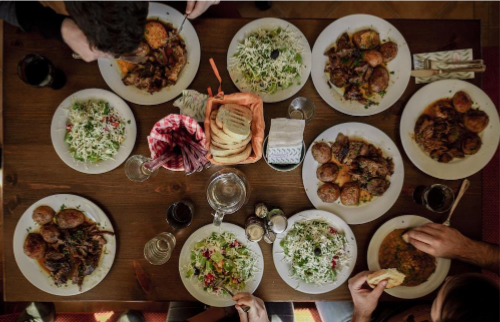Resurrection Day

April 27, 2023
Easter is a global festival and religious celebration that honors Jesus’ life before and after his Resurrection. Resurrection Sunday is another name for the day. Easter’s importance is very significant. Christ is believed to have died on the cross on the day known as Good Friday. Subsequently, Jesus was raised from the dead and appeared on Easter. Dianne Dines ’26, a first-year student at Union Catholic, asserts that “Easter is the celebration of Jesus Christ’s resurrection in the Christian Religion.”
Although it is permissible to celebrate Resurrection Day with eggs and bunnies, it’s crucial to understand and embrace the true meaning of the holiday. The genuine significance of Resurrection Day, according to Bishop Darren Ferguson, pastor of Bethel Baptist Church, is sometimes confused with Easter eggs and other folklore-related events like baskets filled with candy and small gifts.
Christians throughout the world attend church services. However, many countries maintain their own traditions to celebrate the Risen Lord. Like Christmas, Easter has given rise to various traditions, some of which are based on folklore and have little to do with how Christians celebrate the Resurrection. In the United Kingdom, kids roll decorated hard-boiled eggs down hills, and Morris dancing, a traditional English folk dance. Austrailians celebrate Easter with the Easter Bilby, a chocolate bilby (a small, rabbit-like marsupial) that has become an alternative to the traditional Easter bunny. In Sweden, Easter is celebrated around bonfires, and children dress up as Easter witches to go door-to-door for treats.
However, in Greece, Easter is the most important religious holiday. Greek Christians honor Jesus with feasting, church services, and cracking red eggs, which symbolize the Resurrection. In Poland, Easter is celebrated with the blessing of food, where families bring baskets of food to Church to be blessed by a priest. Mexicans organize parades, processions, and reenactments of the Passion of Christ. Similarly, in Brazil, Easter is marked by street festivals, processions, and church services.
In the New Testament, the Bible gives Jesus the designation as the Lamb of God (“Behold the lamb of God which takes away the sins of the world,” John 1:29). From the Old Testament, the Easter lamb custom appropriates the role of the lamb as an offering in ancient Israel. Lamb was once offered as a sacrifice beneath the altar, blessed, and consumed on Easter. Since the 12th century, blessed eggs, ham, cheeses, bread, and sweets have been part of Easter feasts that break the Lenten fast. Easter egg hunts and other festivities are some of the most popular ways for families and friends to celebrate this holiday.
Every Christian tradition celebrates Easter with a different liturgical emphasis. For instance, Protestants in North America gather for the Easter dawn service. This commemorates Mary Magdalene’s visit to the tomb “while it was still dark” (John 20:1) or “just before dawn” (Matthew 28:1 and Luke 24:1), respectively, in the Gospels’ accounts of Jesus’ death and Resurrection. The ritual, which is held as the sun rises to drive away the night, is cheerful.
Many Catholics participate in liturgical celebrations throughout Holy Week to commemorate the events leading up to Jesus’ death and Resurrection. These include the blessing of palm branches, the washing of feet on Holy Thursday, the veneration of the cross on Good Friday, and the Easter Vigil on Holy Saturday. The latter begins after sundown on Holy Saturday and consists of four parts: the Service of Light, the Liturgy of the Word, the Liturgy of Baptism, and the Liturgy of the Eucharist. During the Easter Vigil, new members are initiated into the Church through the sacraments of baptism, confirmation, and Eucharist.












